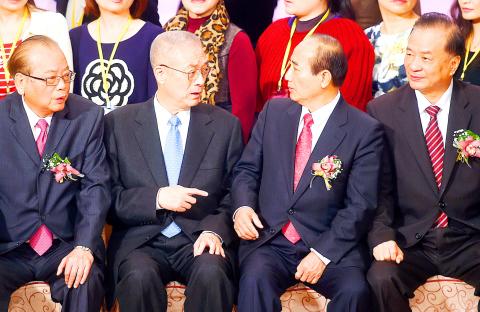The legal case concerning Legislative Speaker Wang Jin-pyng’s (王金平) party membership, which some expected to top the agenda at the Chinese Nationalist Party’s (KMT) Central Standing Committee (CSC) meeting yesterday, was not dealt with, although Vice President Wu Den-yih (吳敦義), who is acting KMT chairman, did say dropping the lawsuit might discredit the party’s Central Evaluation and Discipline Committee.
Wang took the KMT to court in September last year after the committee revoked his membership amid allegations Wang tried to influence justice officials to help an opposition legislator in a legal case.
The Taiwan High Court in September ruled in Wang’s favor, upholding a district court decision in May ruling that Wang still holds his KMT membership. The party filed an appeal.

Photo: Chen I-chuan, Taipei Times
The meeting yesterday was the first after the party’s defeat in the nine-in-one elections on Nov. 29. Many party members, KMT legislators included, had expected Wu, as the acting chairperson, to announce a retraction of the lawsuit against Wang to demonstrate party solidarity.
More than 20 CSC members said at the meeting that the party should drop the case, but Wu decided to hold off on reviewing the proposal.
Earlier yesterday, Wu said he had told Wang that his case would not be discussed at the meeting since “a lot has to be taken into account.”
“The High Court’s ruling has cast doubt on the established authority of the discipline committee, so dropping the lawsuit would be tantamount to endorsing the doubt,” Wu said. “If it did drop the case, how is the KMT to handle violations of party disciplines in the future?”
“We have asked divisions to review the matter, evaluating the effect of a possible retraction and whether it would affect the credibility of the discipline committee,” he added. “The opinions offered by the experts are to be collected for the new party chairperson’s consideration.”
“It would not be appropriate for an acting chairperson to make such a big decision,” Wu said.
Wu said that during his term as acting chairman, which is to last about a month, three major issues need to be settled: a review of the party’s performance in the elections; a public and fair party chairperson by-election; and a discussion about and nominations for council speaker and legislators.
Separately, Wu reiterated that he would not run for the chairmanship and, when asked about the rumor that he would run for president in 2016 with Wang being party chairman, Wu said he had “never heard such reports,” a response echoed by Wang.
Wang also denied that he would join the race for the chairperson role, saying that he had not thought about it.
Wu and Wang said they were open to any candidate for party chairperson after reporters said many have been urging New Taipei City Mayor Eric Chu (朱立倫) to stand.
The KMT set Jan. 17 as the date for the chairperson election.
Additional reporting by Shih Hsiu-chuan

AIR SUPPORT: The Ministry of National Defense thanked the US for the delivery, adding that it was an indicator of the White House’s commitment to the Taiwan Relations Act Deputy Minister of National Defense Po Horng-huei (柏鴻輝) and Representative to the US Alexander Yui on Friday attended a delivery ceremony for the first of Taiwan’s long-awaited 66 F-16C/D Block 70 jets at a Lockheed Martin Corp factory in Greenville, South Carolina. “We are so proud to be the global home of the F-16 and to support Taiwan’s air defense capabilities,” US Representative William Timmons wrote on X, alongside a photograph of Taiwanese and US officials at the event. The F-16C/D Block 70 jets Taiwan ordered have the same capabilities as aircraft that had been upgraded to F-16Vs. The batch of Lockheed Martin

US President Donald Trump yesterday announced sweeping "reciprocal tariffs" on US trading partners, including a 32 percent tax on goods from Taiwan that is set to take effect on Wednesday. At a Rose Garden event, Trump declared a 10 percent baseline tax on imports from all countries, with the White House saying it would take effect on Saturday. Countries with larger trade surpluses with the US would face higher duties beginning on Wednesday, including Taiwan (32 percent), China (34 percent), Japan (24 percent), South Korea (25 percent), Vietnam (46 percent) and Thailand (36 percent). Canada and Mexico, the two largest US trading

GRIDLOCK: The National Fire Agency’s Special Search and Rescue team is on standby to travel to the countries to help out with the rescue effort A powerful earthquake rocked Myanmar and neighboring Thailand yesterday, killing at least three people in Bangkok and burying dozens when a high-rise building under construction collapsed. Footage shared on social media from Myanmar’s second-largest city showed widespread destruction, raising fears that many were trapped under the rubble or killed. The magnitude 7.7 earthquake, with an epicenter near Mandalay in Myanmar, struck at midday and was followed by a strong magnitude 6.4 aftershock. The extent of death, injury and destruction — especially in Myanmar, which is embroiled in a civil war and where information is tightly controlled at the best of times —

China's military today said it began joint army, navy and rocket force exercises around Taiwan to "serve as a stern warning and powerful deterrent against Taiwanese independence," calling President William Lai (賴清德) a "parasite." The exercises come after Lai called Beijing a "foreign hostile force" last month. More than 10 Chinese military ships approached close to Taiwan's 24 nautical mile (44.4km) contiguous zone this morning and Taiwan sent its own warships to respond, two senior Taiwanese officials said. Taiwan has not yet detected any live fire by the Chinese military so far, one of the officials said. The drills took place after US Secretary